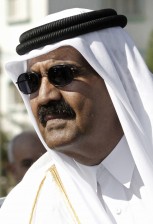Qatar’s emir set to abdicate Tuesday, son to be new ruler

In this Tuesday, Oct. 23, 2012, file photo, Emir of Qatar Sheikh Hamad bin Khalifa al-Thani arrives for cornerstone laying ceremony of a Qatari funded rehabilitation center in Gaza City. Qatar’s emir moves to hand power over to his son, aiming to bring a youthful new face to rule in a tiny Gulf nation that has become one of the most powerful in the Middle East, aggressively spreading its influence through cash. AP PHOTO/HATEM MOUSSA
DOHA—The emir of the small but economically strong Gulf state of Qatar, a major diplomatic broker that has played a key role in the Arab spring, is set to transfer power to his son in a first for the Arab world.
A palace statement said that Qataris will be asked on Tuesday and Wednesday to “swear allegiance to His Highness Sheikh Tamim bin Hamad al-Thani as emir.”
The emir, Sheikh Hamad bin Khalifa al-Thani, will then announce his abdication in favor of his 33-year-old son Tamim, who will become the youngest sovereign of any of the Gulf Arab monarchies.
The official QNA news agency said the emir will address the nation on Tuesday—now declared a public holiday—at 8 a.m. (0500 GMT).
Qatar-based satellite television channel Al-Jazeera said the emir met on Monday “with the royal family and prominent members of Qatari society. He has informed the meeting of his decision to hand power over to his crown prince.”
Article continues after this advertisementSheikh Tamim bin Hamad al-Thani will be the new emir of a gas-rich nation that has punched above its weight in recent years.
Article continues after this advertisementSheikh Hamad, who used Qatar’s immense gas wealth to drive its modernization and transform it into a major player in world diplomacy, came to power in a coup in which he overthrew his own father, Sheikh Khalifa, in June 1995.
A diplomat said that by freely stepping down, the 61-year-old emir would “score a first in the Arab world,” where autocratic rulers held power uncontested for decades until the Arab Spring revolutions that toppled regimes in Tunisia, Egypt and Libya.
Second son
Tamim, born in 1980, is the second son of the emir with his second wife, Sheikha Mozah, and has been groomed for years to take the helm of the super-rich Western ally.
The British-educated Tamim is deputy commander of the armed forces and head of the National Olympic Committee. He also chairs the Qatar 2022 Supreme Committee in charge of hosting the 2022 FIFA World Cup.
Diplomats said that over the past three years the emir has increasingly transferred military and security responsibilities to Tamim who, like his father, went to the British military academy Sandhurst.
He also went to Sherborne school in Dorset.
“The emir is convinced that he should encourage the new generation. He plans to transfer power to the crown prince, Sheikh Tamim, and to carry out a ministerial reshuffle to bring a large number of young people into the cabinet,” a Qatari official told AFP on condition of anonymity.
“The emir could take a step back, that is to say not retire completely but play a more honorary role, so that his son can better assume the responsibilities and become the man in charge,” a French diplomat said.
Economic powerhouse
The emir has developed Qatar into a political and economic powerhouse with multibillion-dollar investments across the world.
The tiny Gulf peninsula holds the world’s third-largest gas reserves and produces roughly 77 million tons of liquefied natural gas per year, making it the world’s largest supplier.
Abdullah al-Azba, editor-in-chief of Doha-based Al-Arab newspaper, told AFP that the emir is also expected “to change the prime minister,” Sheikh Hamad bin Jassem al-Thani.
That post could go to Sheikh Abdullah bin Nasser al-Thani, currently a state minister for internal affairs, or to deputy premier Ahmed bin Abdullah al-Mahmud, according to rumors in Doha.
If appointed, Mahmud would be the first prime minister in the Arab states of the Gulf from outside a ruling family.
Analyst Neil Partrick, an expert on the Gulf, ruled out major changes in Qatar, however.
“Tamim already has responsibilities for sensitive foreign portfolios among other matters,” said Partrick.
“For Qatari foreign policy, none of this seems likely to produce major change. The young heir apparent Tamim is unlikely to effect major changes without consulting his father.”
Qatar took part in the armed intervention in Libya and actively supports rebels trying to topple Syrian President Bashar al-Assad’s regime.
It has major global investments, including in the French football club Paris Saint-Germain, in hotels, in a resort on the Italian island of Sardinia, and stakes in Volkswagen, energy giant Total and Britain’s Barclays Bank.
The Gulf state also controls a powerful media empire through Al-Jazeera, the first pan-Arab satellite channel, which also broadcasts in English, and earlier this year bought struggling US cable channel Current TV in preparation for the launch of Al-Jazeera America.—Taieb Mahjoub